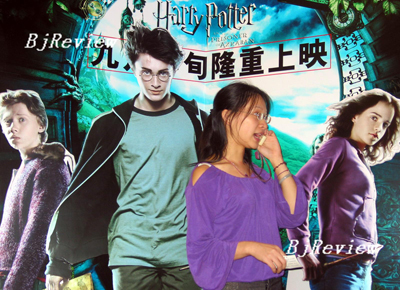
The life of Harry Potter's creator J.K. Rowling reads like novel itself, with her as a Cinderella type character going from rags to riches. She was a single mother, almost penniless and frequently unemployed before the success of her novels. Her fate began to take a different course with the publishing of Harry Potter and the Philosopher's Stone, and now the author's personal fortune is estimated to be around $10 billion from the combined profits of the seven Harry Potter books and movies.
Harry Potter may have begun as a mere character in a book, but he has since become a global industry possibly worth hundreds of billions of dollars. It is a marketing miracle created by not just the author, but also an agent, publisher and movie producer, from which Chinese counterparts could learn a lesson.
"It takes a joint effort to make the promotion and distribution of Harry Potter a big deal," said Wang Xiaoqing, an editor at the SDX Joint Publishing Co. "Publishers better form alliances with various types of media to make the news, to create a mysterious atmosphere around their book and raise the reader's curiosity and expectations."
The media has called the marketing of Harry Potter a "publicized secret campaign." The world entered the Harry Potter era in 2000 when the fourth in the series of books hit bookstore shelves and sold 93,000 copies in just an hour in the U.S. store Barnes & Noble. Not long after that the global sales of Harry Potter books, diary books and calendars amounted to 200 million copies. The first Harry Potter movie was shot the same year.
Harry's first appearance on screen owed thanks to David Heyman, who read the book on the recommendation of his secretary and felt it was fit to become a movie. He sent the book to Time Warner Inc., who offered a fat price to Rowling to buy both the copyright of the Harry Potter movie and the franchising rights of movie related products. These products, called "post-movie products" by business insiders, include movie posters, audio and video products, toys, stamps and digital games.
In the United States, post-movie product profits are four to five times more than the actual box office of movies, accounting for 70 percent of the income of the film industry. Post-movie products, including T-shirts, toys, stationary, games and candy, began to appear in China after the first movie was screened following difficult negotiations.
"You have to obtain franchising authorization before you can sell these post-movie products," said Chen Wei, the owner of a company that sells foreign movie-featured toys. "Few had heard of the word ‘post-movie product' when I started my company," said Chen, who had the idea of opening his toy store after he found there was nowhere in China to buy movie-related toys.
In China there still is no post-movie products industry. Most of the toys sold in Chen's store come from foreign countries. Though the price of these products has been brought down they are still beyond the reach of ordinary Chinese people with the cheapest one retailing for hundreds of yuan and the more expensive products priced at thousands. "Many come to visit my store but few of them are buyers," said Chen.
According to Chen, the franchisers of such post-movie products in China are all small in business scale. In the United States, the consumers of post-movie products are mainly adults, "but in China it is a different scene with few customers, mainly teenagers and some white-collar workers."
Chinese movies began to develop their own post-movie products in 2002 when the renowned Chinese film director Zhang Yimou made his first action movie Hero, harvesting an unprecedented 250 million yuan at the box office (overseas profits excluded). Prior to that, a box office of 20-30 million yuan for a Chinese movie was considered successful.
The movie's audio and video copyrights were sold to three companies at a price of 17.8 million yuan, much more than the previous record of 200,000 yuan. A documentary on the shooting of Hero was also sold at a good price. A novel based on the movie became a hit and stamps featuring characters from the movie were developed. These post-movie products brought in tens of millions of yuan in profits.
Still, the Chinese movie merchandise has trouble competing with its U.S. rivals. "The stamps and swords sell well in our cinema," said Zhang Xiaobing, an operation manager from UME Cinema in Beijing, "But our variety of such products is too small compared to the imported blockbusters." | 